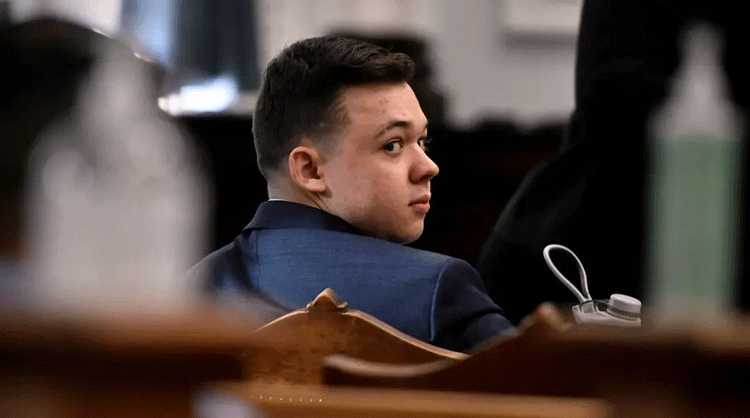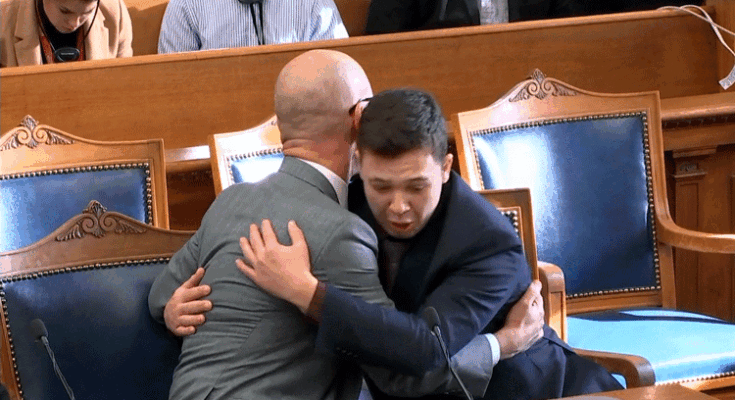Pool Photo: Kyle Rittenhouse, right, reacts after hearing the not guilty verdict.
Contributed Article
KENOSHA, WISCONSIN – After about 26 hours of deliberation, a jury in Kenosha, Wisconsin found Kyle Rittenhouse not guilty on all charges.
The Rittenhouse trial has garnered national attention and has (unfortunately) divided those along political ties rather than rationally looking at the evidence in some cases.
Rittenhouse, 18, was just 17 when he shot three men, killing two and wounding the third.
The shooting occurred during protesting/rioting that followed two days after a Kenosha Police officer had shot a black resident, Jacob Blake.
Rittenhouse had faced several felony charges. His defense insisted he acted in self-defense against those attacking him.
Count 1: First-degree reckless homicide, use of a dangerous weapon
This felony charge is connected to the death of Joseph Rosenbaum, the first man Rittenhouse shot. Bystander video shows Rosenbaum chasing Rittenhouse through a parking lot and throwing a plastic bag at him. Rittenhouse flees behind a car and Rosenbaum follows. A video introduced at trial showed Rittenhouse wheeling around and firing as Rosenbaum chased him. Richie McGinniss, a reporter who was trailing Rittenhouse, testified that Rosenbaum lunged for Rittenhouse’s gun.
Reckless homicide differs from intentional homicide in that prosecutors aren’t alleging Rittenhouse intended to murder Rosenbaum. Instead, they’re alleging Rittenhouse caused Rosenbaum’s death in circumstances showing an utter disregard for human life. Jury verdict: Not guilty.
Count 2: First-degree recklessly endangering safety, use of a dangerous weapon
This felony charge is connected to the Rosenbaum shooting. McGinniss told investigators he was in the line of fire when Rittenhouse shot Rosenbaum. The charge is punishable by 12 1/2 years in prison. The weapons modifier carries an additional five years. Jury verdict: Not guilty.
Count 3: First-degree recklessly endangering safety, use of a dangerous weapon
Video shows an unknown man leaping at Rittenhouse and trying to kick him seconds before Anthony Huber moves his skateboard toward him. Rittenhouse appears to fire two rounds at the man but apparently misses as the man runs away.
This charge is a felony punishable by 12 1/2 years in prison. The weapons modifier again would add up to five more years. Jury verdict: Not guilty.
Count 4: First-degree intentional homicide, use of a dangerous weapon
This charge is in Huber’s death. Video shows Rittenhouse running down the street after shooting Rosenbaum when he falls to the street. Huber leaps at him and swings a skateboard at his head and neck and tries to grab Rittenhouse’s gun before Rittenhouse fires. The criminal complaint alleges Rittenhouse aimed the weapon at Huber.
Intentional homicide means just that — a person killed someone and meant to do it. The count carries a mandatory life sentence. The weapons modifier would add up to five years. Jury verdict: Not guilty.
The jury also was given the option of second-degree intentional homicide and first-degree reckless homicide in Huber’s death.
Second-degree intentional homicide is punishable by up to 60 years in prison.
The first-degree reckless homicide charge sought in Huber’s death matches an original charge in Rosenbaum’s death — it would require jurors to decide that Rittenhouse caused Huber’s death with an utter disregard for human life — and is punishable by up to 60 years in prison.
Count 5: Attempted first-degree intentional homicide, use of a dangerous weapon
This is the charge for Rittenhouse shooting Gaige Grosskreutz in the arm seconds after he shot Huber, and as Grosskreutz came toward him holding a pistol. Grosskreutz survived. Video shows Rittenhouse pointing his gun at Grosskreutz and firing a single round.
The charge carries a maximum sentence of 60 years. The weapons modifier would add up to five more years.

The jury has also been given the option of considering second-degree attempted intentional homicide and first-degree reckless endangerment charges.
The possible punishment for attempted second-degree intentional homicide is 30 years. Attempted first-degree reckless endangerment is punishable by up to 12 1/2 years. Jury verdict: Not guilty.
Count 6: Possession of a dangerous weapon by a person under 18
The judge dismissed this charge on Monday.
Rittenhouse was armed with an AR-style semi-automatic rifle. He was 17 years old on the night of the shootings. Wisconsin law prohibits minors from possessing firearms except for hunting or when supervised by an adult in target practice or instruction in the proper use of a dangerous weapon. Rittenhouse’s attorneys argued that another subsection of the law, regarding short-barreled rifles, provided grounds for dismissing the charge.
Prosecutors argued the defense was misreading the statute, and Schroeder had earlier twice declined to dismiss the charge. But the judge also had said the statute was confusing. After prosecutors conceded that the rifle was not short-barreled, Schroeder dismissed the charge.
Count 7: Failure to comply with an emergency order from state or local government
Rittenhouse was charged with being out on the streets after an 8 p.m. curfew imposed by the city, a minor offense that carries a fine of up to $200. The judge dismissed this charge during the trial, saying the prosecution didn’t offer enough evidence to prove it.
At the conclusion of the hearing, Wisconsin Superior Court Judge Bruce Schroeder thanked the jurors for their service and complimented them on their diligence.











